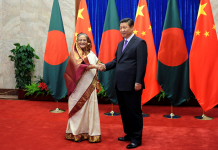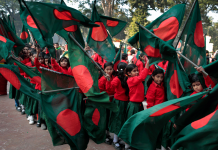Tang Sanjiao (SNUAC)
The title of this article quotes from the song of China’s army participating in the Korean War. From the 1950s until today, it was also the same song that symbolizes the CCP’s propaganda on China’s involvement in the Korean War. Focusing on materials related to a radio station run in Chongqing between 1950 and 1954, this article conducts a regional case study of the CCP (Chinese Communist Party) ’s radio-based propaganda on the Korean War.
As Brady (2016: 3) indicates, propaganda “has always been an essential element of the CCP’s hold on power.” Upon taking over China Mainland by the end of 1949, radio broadcasting was regarded as “one of the most effective tools for massive propaganda and education.”[i] As the most advanced kind of media in the 1950s, the CCP was eager to make use of the radio for propaganda as soon as its national regime was established.
As a domestic context for the CCP’s foundation and operation of radio broadcasting in the early 1950s, there were six Large-scale Administrative Regions (Da xingzhengqu) across China (from 1950 to 1954) (See Figure 1). They played the role between the central level and the provinces. At the same time, a radio station was established by each region. As the CCP was promoting its radio broadcasting network from the central to the basic levels, these regional radio stations indispensably functioned as intermediate links in this process. Among the six regions, Chongqing hosted the Government of Southwest China Administrative Region and the People’s Radio Station of Southwest China (Xinan renmin guangbo diantai). Between 1938 and 1945, Chongqing was the Wartime Capital of China.
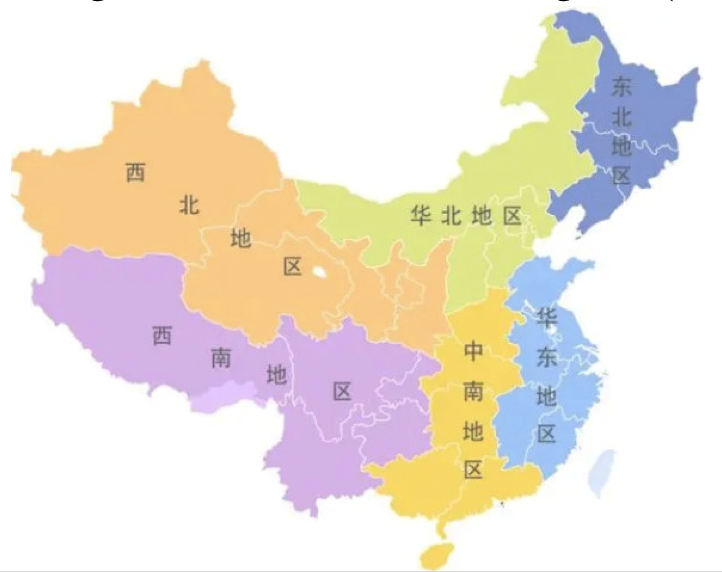
Next to China, the 6·25 War in 1950 initiated the three-year warfare on the Korean Peninsula. In that October, the Chinese army dispatched by the CCP crossed the Yalu River (Amnok River) and participated in the war until 1953. In China, the participation in fighting against the armed forces of South Korea and the UN is widely known as Kangmei yuanchao (Resisting the U.S. and aiding North Korea). Behind the Chinese people’s prevalent misperception of the Korean War, it was the CCP’s propaganda in which radio broadcasting began to play a significant role from the same period.
It was also the first time that the CCP’s propaganda contributed essentially to justifying China’s involvement in international tensions. From then on, beyond remaining critical for the CCP’s hold on power (as Brady figures out), to defend the CCP’s legitimacy, propaganda neither loses its crucial status in justifying China’s tension with certain countries, as what is happening under the most recent collision between China and the U.S. Although the specific kind of media used for propaganda shifted with the advancements of technologies, the CCP is always keen to make full use of the most advanced type of media to optimize its propaganda effectiveness. In the 1950s, radio broadcasting was the most advanced, while nowadays, Internet-based technologies are unprecedentedly facilitating the potential of propaganda. In this sense, to understand today’s China, it is necessary to understand the CCP’s propaganda. To understand the CCP’s propaganda, it is necessary to understand its tried and tested strategies based on media technologies, many of which originated from the ways the CCP used to propagate China’s involvement in the Korea War, as this article aims to argue and explore.
In the field of modern Chinese history, neither the CCP’s radio broadcasting nor its propaganda strategies received much attention from the international academia, although recent years witnessed several achievements with related topics. Regarding the radio broadcasting in Communist China, Wang Yu (2019) conducts an in-depth exploration, probably for the first time, of what Chinese people heard on the radio during the Maoist era. Concentrating on the CCP’s strategies for propaganda, Annie-Marie Brady contributed pioneering research in 2016. As for China’s role in the Korean War, historians’ discussions have been in and out of China. Among them, the results of Shen Zhihua, a Chinese researcher, should by no means be overlooked by international academia. Despite the restrictions in the Chinese academy, he has valuable publications exposing the realities of the participation of China in the Korean War, which are too plentiful to be listed in this article. However, as an intersection of the three areas of scholarship mentioned above, a study specifically dealing with the CCP’s radio propaganda on China’s involvement in the Korean War is yet to come, not to mention a case study based on old and primary sources found in China, most of which have not been accessed or explored by researchers before.
In early 1951, the Southwest China Radio Station received a letter from a student. The student wanted to share the transformation of his or her thought before and after 1949 (the time when the CCP founded its national regime).2 Although, as the editor of the journal of Southwest China Broadcasting commented, the process of the transformation was not persuasive, the student was quite frank in disclosing his or her previous dream that was politically incorrect after 1949. The dream was to go to the U.S. to receive higher education. For his or her part, studying in the U.S. could promise an enviable and comfortable life. Based on the information mentioned in the letter, the writer was from a county seat, probably near Chongqing City. It was a surprising fact that before 1949 even county-level youngsters in China dreamed of studying in the U.S. Behind such an American dream, it was reasonable that a good impression of American aid groups which Chongqing hosted during World War Two played a significant role. In 1945, when the U.S. aid groups were going to return, Chongqing witnessed a farewell meeting participated by tens of thousands of people.
Under this background, for the CCP, it was not an easy task to convince many Chinese people, such as those in Chongqing, of the necessity of participating in the war against the U.S. army. However, drastic shifts in people’s attitudes toward the U.S., as expected by the CCP, did happen. Between 1950 and 1951, the Southwest China Radio Station broadcasted plenty of articles, many of which were selected to be published again on the station’s official journal, emphasizing the point that listening to the radio helped local people understand the necessity of fighting against the U.S. army on the Korean Peninsula. (See Figure 2) As another way to express the support, on a broadcasting convention focusing on the Korean War, large amounts of money, goods, and jewelry were donated on the spot.3
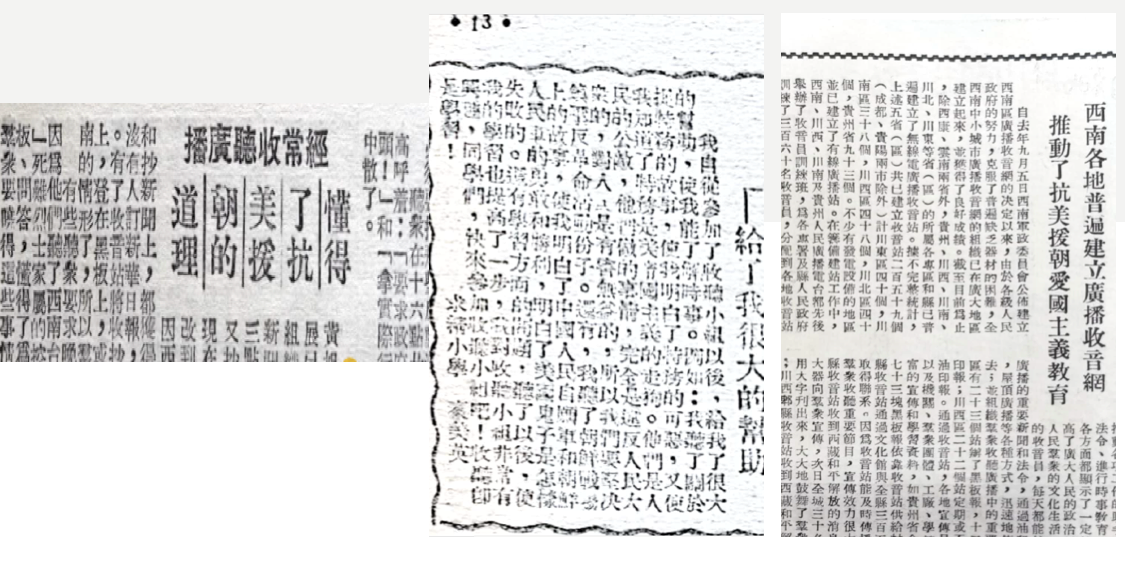
How could the radio-based propaganda achieve such a challenging goal? Through carefully reading and analyzing the broadcasting of Southwest China Radio Station, especially the content related to the Korean War, at least four key strategies were applied in the CCP’s radio-based propaganda and significantly contributed to convincing local residents.
The first strategy is institutionalizing the ways that guaranteed the radio to reach its audience. In practice, the strategy included founding a regular system of shouyinyuan and establishing the network for receiving the radio. Shouyinyuan was a vocation that probably never existed in many other countries. Their job was to promote and organize residents to listen to the radio broadcasting. According to the official requirement, in every county, there should be at least two shouyinyuan.4 In cities with a large population, the number of shouyinyuan should be even more. For instance, 32 shouyinyuan from 23 factories and enterprises in Chongqing City were trained by Southwest China Radio Station.5 Each shouyinyuan was responsible for keeping and taking care of a radio, which was generally scarce at that time. Besides mobilizing and organizing audiences, for enlarging the extent of radio broadcasting, many outreach activities were conducted by shouyinyuan, including blackboard newspapers, mimeograph newspapers, and loudspeakers on the rooftop. All were used to timely disseminate the information from the radio. More importantly, according to the requirement from the central level, all shouyinyuan were formal staff of the government, and their salaries should be included in the budget of the cities or counties. In China after 1949, this is a crucial standard for judging if a person is institutionalized. If all shouyinyuan were covered by the government budget, it meant that this new vocation was totally institutionalized. Institutionalizing shouyinyuan significantly guaranteed a regular and long-term system in making residents stay informed from the radio. As a proof of shouyinyuan’s ability of organization and mobilization, numbers of large-scale broadcasting conventions were held in Chongqing. At least two of them focused on the Korean War, and each was participated by more than hundreds of thousands of audiences in Chongqing and the whole Southwest China. (See Figure 3)
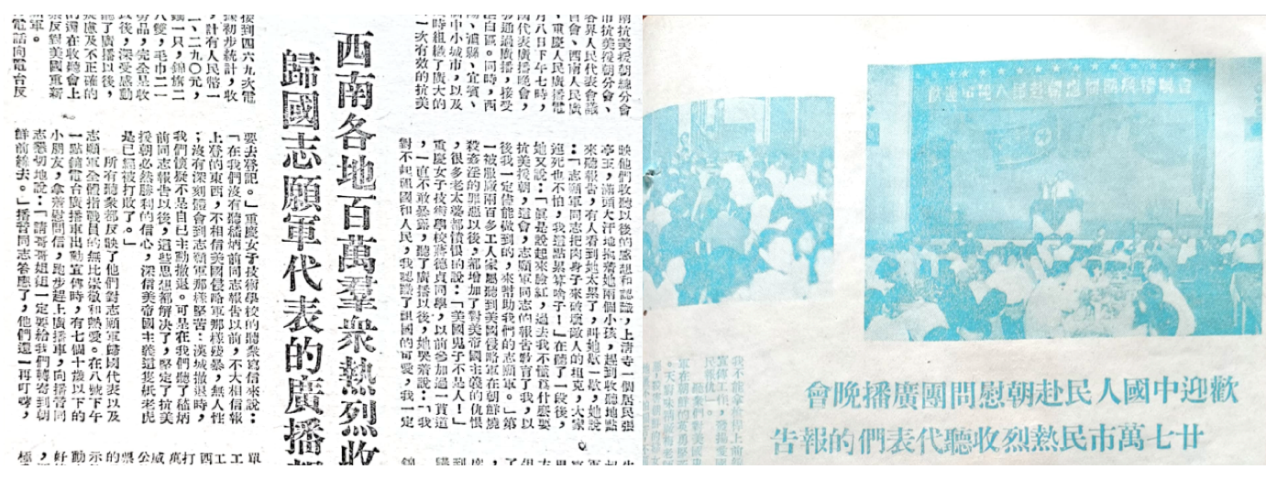
Secondly, it was the politicized content that always took the major part on the radio. Through a rough calculation based on the program lists of Southwest China Radio Station and Chongqing Radio Station (Chongqing Station was led by Southwest China Station), those programs directly related to politics and obviously belonging to propaganda took a proportion of 55 per cent, except for Sunday. (See Figure 4) This statistic did not take the programs of culture and entertainment into consideration. Many of them were, in fact, also propaganda tools in cultural forms. Behind the dominative status of the political agenda, it was the politicized environment in which everyone was required to declare where one stood. As an article published by the Southwest China Radio Station, those staying removed from politics were severely criticized.6 In practice, audiences were required to express their opinions upon listening to the radio. As for the specific content of the politics-related programs, those focusing on the Korean War, usually or even successively, took a major part in the program list. For example, from April to May 1951, for eight consecutive days, the broadcasting from the Southwest China Station was featured with programs propagating China’s participation in the Korean War.7
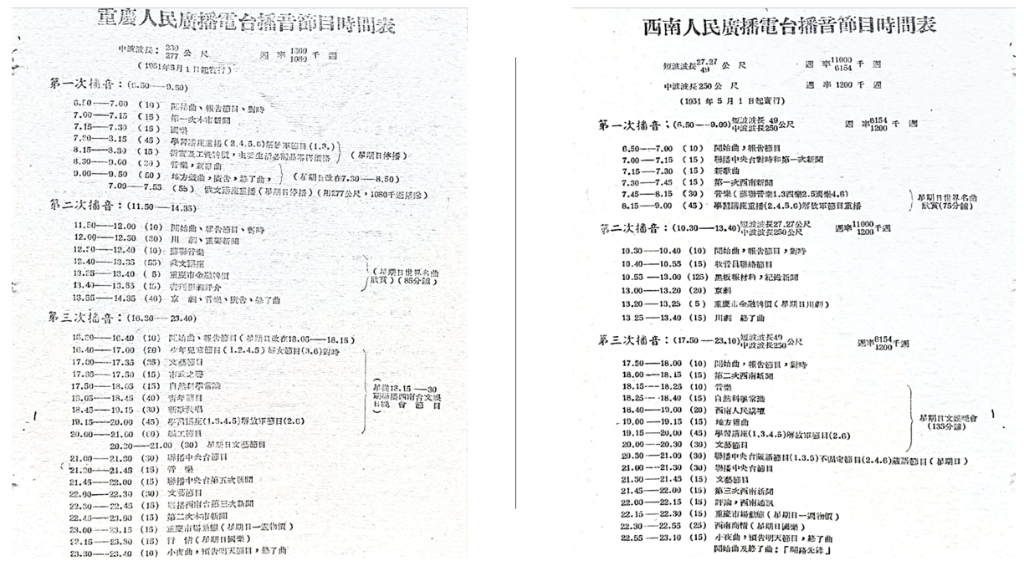
Furthermore, it was the demonization of the U.S., which characterized almost every radio program focusing on the Korean War. More importantly, in order for fully justifying the war against the U.S. army, the demonization was achieved through various perspectives. For example, the VOA program was propagandized as “the most indecent producer of fake news.”8 Japan, which was under the control of the U.S. at that time, was another hot topic.9 Through reminding Chongqing people of the hatred for Japanese invaders, the goal was still to ignite the hatred for Americans. In addition to raking over the past, tactics of fabricating groundless stories were frequently used to deepen the demonized image of the U.S. There was a storytelling performance in Chinese folk-art form broadcasted by the Southwest China Radio Station. It told a story about the U.S. army’s outrage in a town near Chongqing during the World War Two.10 Obviously, it is a totally groundless story fabricated for propaganda function. Similar tactics were also utilized when talking about the Korean warfare, which would be more helpful for igniting Chinese people’s direct hatred for the U.S. army on the Korean Peninsula. On one of the aforementioned large-scale broadcasting conventions in Chongqing, a man returning from Korea shared his experiences in the war. As he declared, more than 15 thousand people were killed by the U.S. army in Pyongyang.11 Although without a specialization in the Korean War, it is still safe to regard this recollection as totally fake news.
Last but not least, the audience groups of the radio broadcasting were maximized as many as possible. Students, factory workers, soldiers, peasants, and women, even including those who stayed at home, were all target audiences of Southwest China Radio Station. The maximized and diversified groups of audiences helped guarantee the effect of propaganda. Among all the audiences, a major target group was the pupils in primary schools. The emphasis on propagating toward children prolonged its influences for several more decades. For fully disclosing how the CCP’s propaganda cultivated hatred in children’s minds, there was one more thing extremely worthy of being mentioned, although it was not directly related to the Korean War. In the early 1950s, a students’ composition competition was organized by the Southwest China Radio Station. After the competition, the one receiving the highest score among all the first prize compositions was published on the station’s journal. (See Figure 5) Titled as My Father is My Enemy, the composition was about the pupil author’s thought transformation after his/her father was arrested due to spy suspicion. The pupil was influenced deeply by a radio story in which a boy killed his spy father with poison. Then the author generated deep hatred for his/her spy father too. In such a composition competition with a propaganda background, choosing this one as the NO. 1 first prize clarified the CCP’s strong willingness to cultivate hatred in children’s minds, not only for foreign countries like the U.S. but also for the so-called “domestic enemies” who might threaten the regime.
Upon understanding these four key strategies, we will not feel surprised in front of the surprising effect of the CCP’s radio-based propaganda on China’s necessity of involving in the Korean War. When the institutionalized system maximized the audience groups of the radio broadcasting, which was highly politicized with plenty of demonized images of the U.S., the CCP’s propaganda on the Korean War has even become a source of Chinese people’s collective memory that remains alive for several generations. Nowadays, every time the CCP needs to remind Chinese people of its unpleasant relationship with the U.S., the song quoted at the beginning of this article probably will be heard again from Chinese media with a propaganda background.
Currently, specific forms and methods of the CCP’s propaganda are swiftly developing with the progress of technologies, especially including the Internet. Yet, if capturing the essence of the CCP’s propagandistic activities despite external variations, strategies similar to what this article explores keep working effectively, especially when the CCP involves international tensions. But the similarity over 70 years is not astounding at all, since all history is contemporary history, as a famous saying goes.
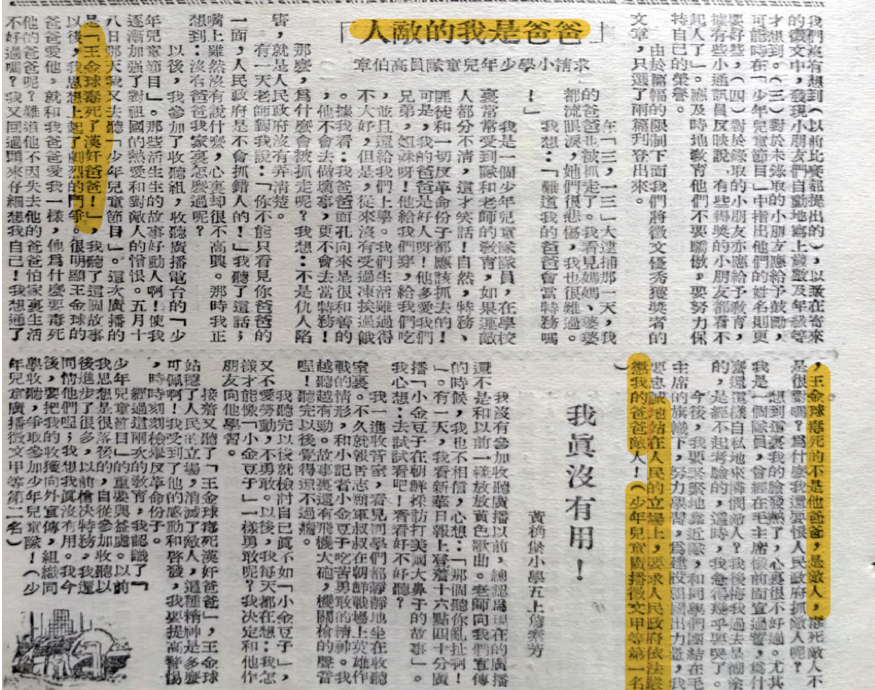
Bio
Sanjiao Tang(stan953@aucklanduni.ac.nz)
received his Ph.D. degree from the University of Auckland in December 2021. Focusing on the history of Mao’s China, he bases his work on primary sources, including official records, such as archives, gazetteers, brochures, and private materials like diaries, notebooks, account books, and unpublished memoirs. Benefitting from them, his research distinguishes from most existing ones. Now he is a visiting research fellow at SNUAC. One of his current projects is re-accessing the CCP’s propaganda in the early 1950s, including its propaganda on the Korean War toward Chinese people at the grassroots.
Primary/Old Sources:
1 “Geji lingdao jiguan yingdang youxiaode liyong wuxiandian guangbo (The authorities at each level should effectively make use of radio broadcasting).” Renmin ribao (People’s Daily), June 6, 1950.
2 “Guanyu xie sixiang zhuanbian de jige wenti (Several issues about writing thought transformation).” Xinan guangbo (Southwest China Broadcasting) 2&3, April 1951, 18.
3 “Xinan gedi baiwan qunzhong relie shouting zhiyuanjun daibiao de guangbo baogao (Millions of people in Southwest China enthusiastically listened to the broadcasting report of the representative solider returning from Korea).” Xinan guangbo (Southwest China Broadcasting) 4&5, June 1951, 17.
4 Xinan renmin guangbo diantai. 1951. “Guanyu jianli shouyinwang de buchong banfa (Supplementary solutions about founding the network for receiving the broadcasting).” Shoulian tongxun (internal materials) 1, April, 4-5.
5 Xinan renmin guangbo diantai. 1951. “Xinan renmin guangbo diantai shouyinyuan xunlianban dierqi xiaojie (A short summary on the second term of training class for shouyinyuan by the Southwest China Radio Station).” Shoulian tongxun (internal materials) 1, April, 15-16.
6 “Fandui buwen zhengzhi de qingxiang (Opposing the trend of staying removed from politics).” Xinan guangbo (Southwest China Broadcasting) 11, November 1951, 23.
7 “Xinan renmin guangbo diantai si wuyuefen bianbo gongzuo zonghe baogao (An integrated report on the editing and broadcasting work of the Southwest China Radio Station).” Xinan guangbo (Southwest China Broadcasting) 6, July 1951, 21-22.
8 “Juting meiguo zhiyin, quzhu zaoyao zhiyin (Refuse to listen to the VOA and expel the VOA).” Xinan guangbo (Southwest China Broadcasting) 2&3, April 1951, 27-28.
9 “Jianjue fandui Meiguo wuzhuang riben (Firmly oppose militarize Japan by the U.S.).” Xinan guangbo (Southwest China Broadcasting) 4&5, June 1951, 16.
10“Yuanchou haiyang shen (The hatred is as deep as the sea).” Xinan guangbo (Southwest China Broadcasting) 2&3, April 1951, 38-39.
11 Zhao Guoyou (Min Buyang recorded). “Yingxiong de renmin, yingxiong de jundui: wo dao Chaoxian qu weiwen guilai de jidian tihui (Heroic people and heroic army: my several feelings after finishing consolation and returning from Korea).” Xinan guangbo (Southwest China Broadcasting) 6, July 1951, 10-11.
References:
- Brady, Annie-Marie. 2016. Marketing dictatorship: propaganda and thought work in contemporary China. Lanham: Rowman & Littlefield Publishers.
- Wang, Yu. 2019. “Listening to the State: Radio and the Technopolitics of Sound in Mao’s China.” Ph.D. Diss., University of Toronto.


